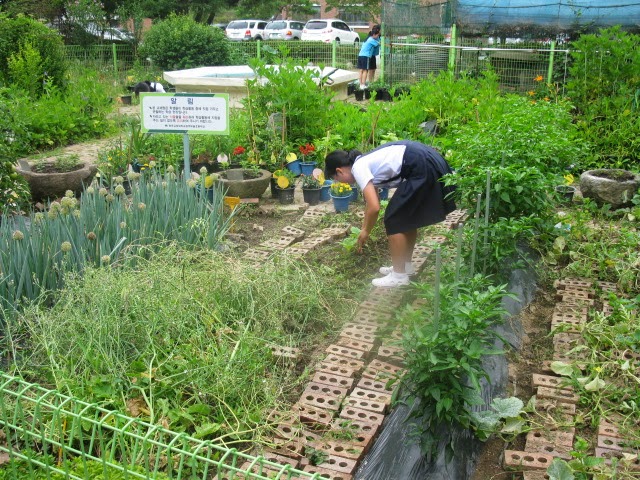 It is also home to Gwangju University and Gwangju Elementary. These schools form a partnership to train future elementary school teachers. Gwangju Elementary is one of seventeen National primary schools, which mean they have a direct partnership with a University. Students are selected on a lottery basis, where only one out of eight applicants are selected for a total enrollment of 582 students grades 1st through 6th.
It is also home to Gwangju University and Gwangju Elementary. These schools form a partnership to train future elementary school teachers. Gwangju Elementary is one of seventeen National primary schools, which mean they have a direct partnership with a University. Students are selected on a lottery basis, where only one out of eight applicants are selected for a total enrollment of 582 students grades 1st through 6th. Being a National primary school means that they regularly open their doors and classrooms for student teachers throughout the year and are no stranger to visitors. This was very apparent as the Ag Educators on our trip from Connecticut, Florida and Pennsylvania were greeted by the vice principal and allowed to eat lunch with the 5th and 6th grade students and observe a 2nd grade class being taught.
 We were given a tour of the school and met with some of their teachers. You may be wondering what this has to do with global based agriculture education. Well elementary school teachers in Korea teach practical arts in 5th and 6th grade, which encompasses agriculture, family and consumer sciences, technology, engineering and others.
We were given a tour of the school and met with some of their teachers. You may be wondering what this has to do with global based agriculture education. Well elementary school teachers in Korea teach practical arts in 5th and 6th grade, which encompasses agriculture, family and consumer sciences, technology, engineering and others. During practical arts, students receive instruction 1-2 days a week for 1-3 hours each day. We were excited to see many students volunteering after lunch in their free time to work the school garden, water plants, pulling weeds and feeding the rabbits in the rabbit hutch. Students also plant, label, and identify almost 50 different landscape plants. Imagine if every elementary school in America had this same opportunity. We were excited to learn that some of the crops grown in the garden were used in the school lunchroom.
 At Gwangju University we met students in the Elementary Education program and discussed how their practical arts program ties into their education. Students take classes in practical arts dealing with subjects such as electricity, woodworking, sewing, robotics, computers, cooking and agriculture. What a concept we could learn from our Korean counterparts.
At Gwangju University we met students in the Elementary Education program and discussed how their practical arts program ties into their education. Students take classes in practical arts dealing with subjects such as electricity, woodworking, sewing, robotics, computers, cooking and agriculture. What a concept we could learn from our Korean counterparts. As we met with the Gwangju University students, we sat down and talked with them to develop a partnership to help these future teachers to incorporate ideas and lessons in their classrooms such as teaching elementary school students the importance of agriculture. I personally look forward to working with the student teachers I met to provide them resources and lessons to enhance their agriculture knowledge.
 Overall I was very impressed to see the importance that Koreans place on teaching practical arts in elementary schools. I was also challenged as an agriculture teacher to do more for not only the local elementary school students around Plant City, but also at a global level to help other teachers incorporate agricultural concepts into their curriculum.
Overall I was very impressed to see the importance that Koreans place on teaching practical arts in elementary schools. I was also challenged as an agriculture teacher to do more for not only the local elementary school students around Plant City, but also at a global level to help other teachers incorporate agricultural concepts into their curriculum.
Amazing! It really makes you feel as though we missed the boat when talking about agriculture and human ecology opportunities in elementary schools, doesn't it?
ReplyDelete